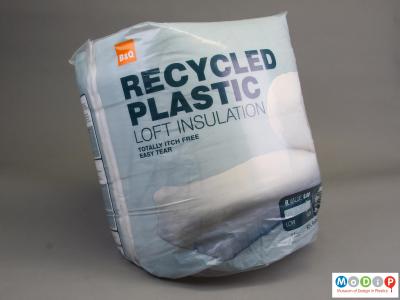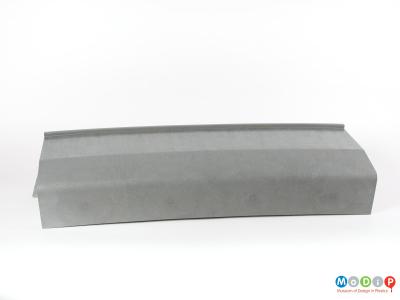Plastics are used in the construction industry for a variety of applications because they are light in weight, strong, durable, and resistant to corrosion. By using recycled plastics, the industry can improve its environmentally efficient practices.
The material in this roll of loft insulation (1) is made of 90% recycled plastic bottles with 10% polyester bonding. It is an efficient, cleaner alternative to the traditional glass fibre, free from floating fibres and therefore does not cause any itching or irritation to the installer. According to the Energy Saving Trust, a significant amount of energy is used to heat an uninsulated house and nearly a quarter of this heat is lost through the roof. By using recycled plastic bottles as a material for insulation, B&Q has tapped into two green issues. The first being recycling, using materials that may have otherwise gone into landfill, and secondly, the energy saving issue of insulating a house to prevent loss of heat.
The Durakerb® (2) is a lightweight and environmentally friendly kerbstone. When it was first launched the aim was to offer ‘a kerb edge feature that provides an easier, safer, simpler, quicker, better and more sustainable solution that delivers equivalent performance to the traditional product.’ Since Durakerb®’s introduction in 2005 there has been in excess of 400,000 linear meters installed in highways, car parks, office and industrial projects across the UK and Ireland. This is equivalent to over 72 million recycled bottles, caps and closures. The design has a simple interlocking feature at the sides to ensure 100% alignment. The Durakerb® offers a 40% reduction in carbon emissions compared with precast concrete units in manufacture. At just under 6kg, the Durakerb® is less than one third of the manual handling limit of 20kg and mitigates repetitive strain injury; it can therefore be installed manually. It can also be cut using hand tools, therefore reducing the need for powered moving or cutting equipment, saving energy and fuel. It is extremely durable offering a substantial reduction in breakages and spalling (chipping or splintering), minimising remedial and maintenance costs.


